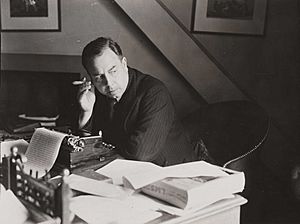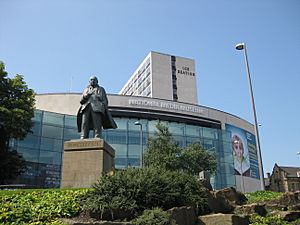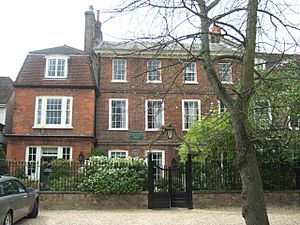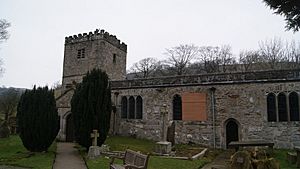J. B. Priestley facts for kids
Quick facts for kids
J. B. Priestley
|
|
|---|---|

J. B. Priestley at work in the study at his home in Highgate, London
|
|
| Born | 13 September 1894 Manningham, Bradford, West Riding of Yorkshire, England |
| Died | 14 August 1984 (aged 89) Alveston, Warwickshire, England |
| Occupation |
|
| Period | 20th century |
| Spouse |
Pat Tempest
(m. 1921; died 1925)Jane Wyndham-Lewis
(m. 1925; div. 1953) |
| Children | 5, including Sylvia, Mary and Tom |
John Boynton Priestley (13 September 1894 – 14 August 1984) was a famous English writer. He wrote many novels, plays, and screenplays. He was also a popular radio broadcaster and shared his thoughts on society.
Priestley grew up in Yorkshire, England. This background often appeared in his stories. His novel The Good Companions (1929) made him very well-known. Many of his plays explore interesting ideas about time, sometimes showing characters experiencing different moments in time.
During World War II, Priestley gave radio talks that helped boost people's spirits. His ideas about society also influenced the creation of the welfare state in the UK.
Contents
Early Life and Education
John Boynton Priestley was born on 13 September 1894 in Manningham, a suburb of Bradford. His father, Jonathan Priestley, was a headmaster. His mother, Emma, passed away when he was only two years old. His father remarried four years later.
Priestley went to Belle Vue Grammar School. He left school at 16 to work as a clerk at a wool company called Helm & Co. While working there from 1910 to 1914, he started writing at night. His articles were published in local and London newspapers. He often used his memories of Bradford in his later works.
Serving in World War I
Priestley joined the British army in September 1914, at the start of the First World War. He served in France as a Lance-Corporal. In June 1916, he was badly wounded when a trench mortar buried him alive.
He spent many months recovering in hospitals. In 1918, he became an officer. After the war, he was released from service in early 1919.
Becoming a Writer
After the war, Priestley went to Trinity Hall, Cambridge for his university education. By the time he was 30, he was known as a good essay writer and critic. His novel Benighted (1927) was even made into a film called The Old Dark House in 1932.
Major Successes in Novels
Priestley's first big success was the novel The Good Companions in 1929. This book won him an award and made him a famous writer across the country. His next novel, Angel Pavement (1930), also did very well.
In 1934, he wrote English Journey. This book described what he saw and heard while traveling through England during the Great Depression.
Famous Plays
Priestley also became very well-known as a playwright. His play Dangerous Corner (1932) was the first of many successful plays. These plays kept audiences excited in London's West End theatres.
His most famous play is An Inspector Calls (1945). Many of his plays explore different ideas about time.
Broadcasting During World War II
During the Second World War, Priestley was a regular broadcaster for the BBC. His radio talks, called Postscript, were very popular. In 1940 and 1941, up to 16 million people listened to them. Only Churchill was more popular with listeners.
Some people, like writer Graham Greene, felt that Priestley became a leader almost as important as Churchill. He helped give people hope and a vision for Britain after the war. His broadcasts were thought to have influenced the Labour Party's big win in the 1945 general election.
Later Life and Achievements
Priestley was a founding member of the Campaign for Nuclear Disarmament in 1958. This group worked to stop the use of nuclear weapons.
In 1960, he published Literature and Western Man. This large book looked at Western literature from the 15th century up to his time.
He was very interested in the idea of time. In 1964, he wrote an essay called Man and Time. In this book, he explored different theories about time. He also shared his own ideas and research, including thoughts on precognitive dreaming (dreams that seem to predict the future).
The University of Bradford honored Priestley in 1970 with a special degree. He also received the Freedom of the City of Bradford in 1973. The J. B. Priestley Library at the University of Bradford is named after him. A large statue of him stands in front of the National Media Museum in Bradford.
Personal Interests
Priestley loved classical music, especially chamber music. This love is shown in some of his books, like his favorite novel, Bright Day. He also helped raise money for the London Philharmonic Orchestra in 1941. In 1949, an opera called The Olympians, with words written by Priestley, was performed for the first time.
Priestley turned down offers to become a life peer (a member of the House of Lords) and a Companion of Honour. However, he did become a member of the Order of Merit in 1977. This is a very special honor given by the King or Queen. He also represented Britain at UNESCO conferences.
His Family Life
Priestley was married three times. His first wife was Emily "Pat" Tempest. They had two daughters, Barbara and Sylvia. Sadly, Pat died of cancer in 1925.
In 1926, he married Jane Wyndham-Lewis. They had two daughters, including music therapist Mary Priestley, and one son, the film editor Tom Priestley. They lived for many years at 3, The Grove in Highgate, which was once the home of the poet Samuel Taylor Coleridge.
In 1953, Priestley married the archaeologist and writer Jacquetta Hawkes. They worked together on a play called Dragon's Mouth. They lived in Alveston, Warwickshire, later in his life.
Death and Legacy
J. B. Priestley passed away from pneumonia on 14 August 1984, just before his ninetieth birthday. His ashes were buried in the churchyard at Hubberholme in Yorkshire.
Archives
Many of Priestley's important papers are kept at the Harry Ransom Center at the University of Texas at Austin. This collection includes original handwritten copies of his works and many letters.
The University of Bradford Library also has a special collection of his materials. This includes scripts, articles, photos, and even his famous pipe.
See also
 In Spanish: J. B. Priestley para niños
In Spanish: J. B. Priestley para niños




